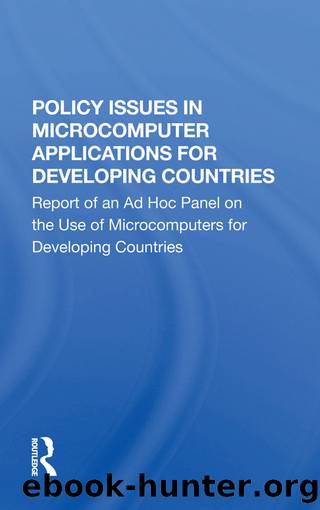Policy Issues In Microcomputer Applications For Developing Countries by National Academy of Sciences

Author:National Academy of Sciences [National Academy of Sciences]
Language: eng
Format: epub
ISBN: 9780367298678
Barnesnoble:
Publisher: Taylor & Francis
Published: 2021-05-31T00:00:00+00:00
Hardwareâthe Weak Link
Our analogy between AI research and the application of microcomputers in developing countries is valid only in terms of how each problem should be posed. Whereas AI had to wait more than two decades for a major breakthrough, technology currently exists to build a microcomputing machine adapted to developing-country environments. The Automation and Control Laboratory (ACL) of the School of Engineering, University of Yaoundé, Cameroon, has suggested how such a machine might be built.1 One reason for not applying these existing technologies to build such a machine is, perhaps, the de-emphasis on hardware, particularly as far as local design and manufacture in developing countries are concerned.
Hardware issues seem to be transparent to those in industrialized countries involved in the transfer of microcomputer technology to developing countries. If the hardware issue is raised at all, they are likely to point out the absence of a relative technical advantage in developing countries, with respect to industrialized countries, to produce hardware adapted to developing-country environments.
Taking hardware for granted is in keeping with the way the computer industry as a whole, and the microcomputer sector in particular, have evolved. At the beginning, hardware was at a premiumâsoftware was occasionally thrown in to encourage potential clients to buy the hardware. Since then, hardware costs have plummeted beyond all expectations. At the same time, software has become increasingly expensive. It is now the premium item, and in some instances, system developers will now throw in the microcomputer hardware if clients will buy the software.
Although the technology is still in its infancy in mast developing countries, it is becoming obvious to this observer that hardware expertise is the weakest link in the chain of competencies that are required to make microcomputers take firm root. Packaged software may not always be perfect for a given application, but it can be made to do some of the job well, or all of the job fairly well. If that fails, with a good language manual an intelligent user can generate usable software in a reasonably short time. The same is not true of hardware. And whereas software debugging tools are quite advanced, microcomputer use appears to remain predicated on the assumption that the hardware will work perfectly. Diagnostic tools for debugging software are much more useful to a nonprogrammer, than autodiagnostics for hardware are to a noncomputer engineer.
Download
This site does not store any files on its server. We only index and link to content provided by other sites. Please contact the content providers to delete copyright contents if any and email us, we'll remove relevant links or contents immediately.
Collaborating with Parents for Early School Success : The Achieving-Behaving-Caring Program by Stephanie H. McConaughy; Pam Kay; Julie A. Welkowitz; Kim Hewitt; Martha D. Fitzgerald(916)
Entrepreneurship Education and Training: The Issue of Effectiveness by Colette Henry Frances Hill Claire Leitch(683)
Materializing the Middle Passage by Jane Webster;(512)
Adding Value to Policy Analysis and Advice by Claudia Scott; Karen Baehler(500)
Race and American Political Development by unknow(493)
Sociological Perspectives of Health and Illness by Constantinos N. Phellas(493)
American Government and Politics Today by Steffen W. Schmidt Mack C. Shelley Barbara A. Bardes(488)
Human and Global Security : An Exploration of Terms by Peter Stoett(477)
Control Of Oil - Hardback by Kayal(476)
The Disappearance of Rituals: A Topology of the Present by Byung-Chul Han(421)
The Catholic Church and European State Formation, AD 1000-1500 by Jørgen Møller(406)
Advances in Child Development and Behavior, Volume 37 by Patricia J. Bauer(405)
The World According to China by Elizabeth C. Economy(390)
Theories of Counseling and Psychotherapy: A Case Approach by Nancy L. Murdock(383)
Application of classical statistics, logratio transformation and multifractal approaches to delineate geochemical anomalies in the Zarshuran gold district, NW Iran by unknow(377)
Left Is Not Woke by Susan Neiman(373)
Cross-Cultural Child Development for Social Workers by Lena Robinson(360)
Turkey's Relations with the West and the Turkic Republics: The Rise and Fall of the Turkish Model by Idris Bal(357)
Japan's Ainu Minority in Tokyo by Mark K. Watson(344)
